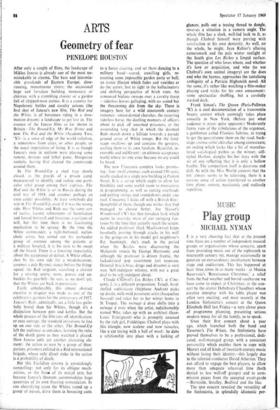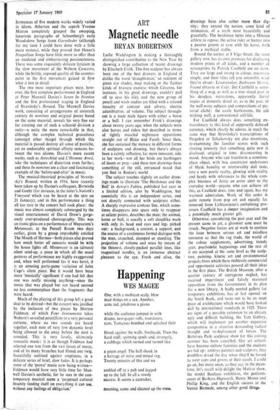Play group MUSIC
MICHAEL NYMAN
1: is a very cheering fact that at the present time there are a number of independent musical groups or organisations whose concerts, apart frqm providing music out of the eighteenth to nineteenth century rut, manage occasionally to generate an extraordinary involvement between stage and auditorium. This has happened at least three.times in as many weeks—at Musica Reservata's 'Renaissance Christmas,' a relief from the bad weather and horrid saccharine we have come to expect at Christmas; at the con- cert by the sitarist Debabrata Chaudhuri whose creative interplay with his tabla player was often very exciting; and most recently at the London Sinfonietta's concert at the Queen Elizabeth Hall last Friday—a very clever piece of programme planning, presenting serious modern music for all the family, so to speak.
Since their first concert about a year ago, which launched both the band and Taverner's The Whale, the Sinfonietta have proved themselves to be a professional, dedi- cated, well-managed group, with a consistent personality which enables them to cope with Mozart and all kinds of twentieth century music without losing their identity—this largely due to the talented conductor David Atherton. They can afford to engage the best players, to allow more than adequate rehearsal time (both. denied to less well-off groups) and to com7 mission pieces from the accepted avant-garde —Birtwistle, Smalley, Bedford and the like.
The QE1i concert revealed the versatility of the Sinfonietta, in splendidly idiomatic per-
formances of five modem works widely varied in idiom. Atherton and the superb Yvonne Minton completely grasped the sweeping, luxurious paragraphs of Schoenberg's early Wood-dove Songs from Gurrelieder (although for my taste I could have done with a little more ecstasy), while they proved that Henze's Neapolitan Songs have little more to offer than an outdated and embarrassing passionateness.
There was some exquisitely delicate lyricism in the slow movement of the Webern Concerto, while the brittle, exposed quality of the counter- point in the first movement gained in flow what it lost in detail.
The two most important pieces were, how- ever, the first complete performance in England of Peter Maxwell Davies's Seven In NomThe and the first professional staging in England of Stravinsky's Renard. The Maxwell Davies work, consisting of arrangements of sixteenth century In nomines and original pieces based on the same material, reveals his very fine ear for creating out of such a schizoid division a unity—a unity the more remarkable in that, although the complex technical procedures (amongst other things) through which this material is passed destroy all sense of pastiche, yet an undeniable spiritual affinity remains be- tween the two idioms. Davies's more recent works, such as Antechrist and L'Homme Arnie, take the techniques of distortion even further, and these In nomines are a clear and fascinating example of the 'before-and-after' in music.
The musical-theatrical principles of Stravin- sky's Renard, written in 1916, have recently been taken up by Davies's colleagues, Birtwistle and Goehr (for instance, in the tatter's Naboth's Vineyard which can be heard at the QM on 21 January); and in this performance a thing all too rare in the concert hall took place: the music was almost completely submerged by the visual entertainment of David Drew's gorge- ously over-produced choreography. This was an ironic gloss on a performance of Mayuzumi's Metamusic, at the Purcell Room two days earlier, given by a group improbably entitled The Mouth of Hermes—both pieces also proved how much better all concerts would be with the house lights off. Metamusic is an (almost) silent send-up, a piece in which all the usual gestures of performance are highly exaggerated and, when well performed (as it was here), it is an amusing party-game variation of John Cage's silent piece. But it would have been more 'musically' significant if one had felt that one was really missing anything—since the music that was played but not heard seemed no less commonplace than the fragments that were heard.
Much of the playing of this group left a good deal to be desired—but the concert was justified by the inclusion of two pieces by Morton Feldman, of which Four Instruments takes Webern's so-called pointillism to a very personal extreme, where no two sounds are heard together, each note of very low dynamic level being allowed to die away before the next is sounded. This is very lovely, ultimately romantic music: it is as though Feldman had selected one tree from the vast forest of music, and of its many branches had filmed one twig, beautifully outlined against emptiness, in a
delicate series of brief, slow fades. It is perhaps some of the 'purest' music now being written— Feldman would have very little time for Max- well Davies's aesthetic, for be sees in the con- temporary musical scene a 'perpetual cultural insanity feeding itself on everything it can use, without any feelings of obligation.'



































 Previous page
Previous page